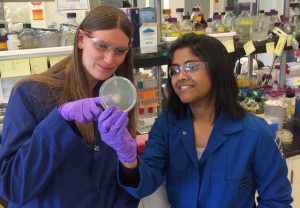A strain of bacteria, Escherichia coli (E. coli), engineered by researchers at Lawrence Berkley National Laboratory enables a “one-pot” method for producing advanced biofuels from a slurry of pre-treated plant material. The bacteria is able to tolerate the liquid salt used to break down plant biomass into sugar-based polymers. However, the salt solvent, called ionic liquids, interferes with later stages of the production process; thus, it needs to be removed. This problem is solved with the engineered strain and eliminates the need to remove ionic liquids saving time and money.

Marijke Frederix (left) and Aindrila Mukhopadhyay in a microbiology lab at the Joint BioEnergy Institute. (Credit: Irina Silva/JBEI, Berkeley Lab)
“Being able to put everything together at one point, walk away, come back, and then get your fuel, is a necessary step in moving forward with a biofuel economy,” said study principal investigator Aindrila Mukhopadhyay, vice president of the Fuels Synthesis Division at the Joint BioEnergy Institute (JBEI), a DOE Bioenergy Research Center at Berkeley Lab. “The E. coli we’ve developed gets us closer to that goal. It is like a chassis that we build other things onto, like the chassis of a car. It can be used to integrate multiple recent technologies to convert a renewable carbon source like switchgrass to an advanced jet fuel.” Study results were published in Green Chemistry journal.
As explained by Aindrila, the basic steps of biofuel production start with breaking apart the cellulose, hemicellulose and lignin that are bound together in the complex plant structure. Traditionally, enzymes are then added to release the sugars from the mixture of cellulose and hemicellulose, a step called saccharification. Bacteria can then take that sugar and churn out the desired biofuel. The multiple steps are all done in separate “pots”.
A JBEI research team has pioneered the use of ionic liquids, salts that are liquid at room temperature, to tackle the deconstruction of plant material because of the efficiency with which the solvent works. However, what makes ionic liquids ideal for deconstruction also makes it harmful for the downstream enzymes and bacteria used in biofuel production. Based on previous work, a suite of saccharification enzymes were discovered that were tolerant to ionic liquids.
Marijke Frederix, this recent study’s first author and a postdoctoral researcher in Mukhopadhyay’s lab, established that an amino acid mutation in the gene rcdA, which helps regulate various genes, leads to an E. coli strain that is highly tolerant to ionic liquids. The research team used this strain as the foundation, and tested the E. coli strain using ionic-liquid pretreated switchgrass.
“Armed with the rcdA variant, we were able to engineer a strain of E. coli that could not only tolerate ionic liquid, but that could also produce ionic-liquid-tolerant enzymes that chew up the cellulose, make sugars, eat it and make biofuels,” said Frederix. “E. coli remains the workhorse microbial host in synthetic biology, and in our study, using the ionic-liquid-tolerant E. coli strain, we can combine many earlier discoveries to create an advanced biofuel in a single pot.”
The research was also able to create d-limonene, a precursor to jet fuel. Ultimately, the research team hopes to create processes that are robust and simple and can directly convert any renewable plant material into biofuel in one single pot.

